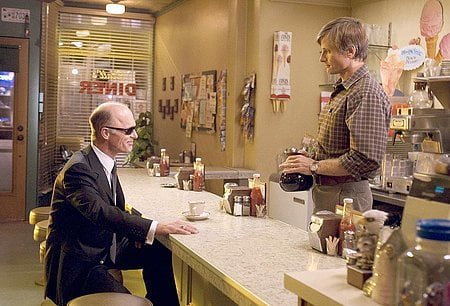A History of Violence

Tom Stall (Viggo Mortensen) is happily married to Edie (Maria Bello), loves their two kids and owns a diner in the small town of Millbrook, Indiana. When a pair of ruthlesskillers enters his shop and prepares to do some serious mayhem, Tom stops them with deadly force and becomes a local hero. But, the spotlight of fame will have dire consequences for the family man in “A History of Violence.”
Laura's Review: B+
When a couple of bad guys threaten the employees of Stall's diner, Tom Stall (Viggo Mortensen, "The Lord of the Rings'" Aragorn) takes almost uncanny action, killing both men before they knew what hit them. Tom's ensuing celebrity brings a black-suited mobster in a big black car to the small town and he has an interesting accusation to make. Carl Fogaty (Ed Harris, "Radio") claims that Tom is really Joey Cusack and that Joey has "A History of Violence." David Cronenberg's ("Spider") elegant direction of Josh Olson's adaptation of John Wagner and Vince Locke's graphic novel almost seems like overkill for this spare and obvious tale. There is never really any question as to Tom's identity and the simplistic message is that violence begets violence in a never-ending human cycle, not the greatest of insights. What makes "A History of Violence" special is how Cronenberg adds weight to the graphic novel while visually glorifying the medium. Tom's story is mirrored in his teenaged son's. Jack Stall (Ashton Holmes, TV's "One Life to Live") is the victim of bullying at high school. It is a beautiful piece of work when the pecking order is established, Jack's tormentor Bobby (Kyle Schmid, "The Sisterhood of the Traveling Pants") faced down by the guys who threaten Tom's diner as they're driving into town - crisscross goes the violence across this film's landscape. And just as those thugs menace Tom's waitress, so does Fogaty go after Tom's wife, appealing to her curiosity while threatening her and her young daughter Sarah (Heidi Hayes) with niceties. Edie Stall's (Maria Bello, "Assault on Precinct 13") belief in her husband begins to crumble (an early, playful sex scene between the two is mirrored with an uglier, more urgent encounter on an interior stairwell) and eventually he goes to face his past, namely a big city mobster who happens to be his brother, Richie Cusack (William Hurt, "The Village"), a man who wants him dead. Viggo Mortensen's gotten a lot of praise for this performance, but frankly, I found him to be turning on and off like a light switch. He does engender sympathy, however, as a man who tried to leave his violent past behind, a family man whose family will be forever changed (the character's name, Stall, defines putting off the inevitable.) Better is Bello, the fiercely maternal Edie who gathers her cubs and watches her husband warily, like a stranger. Ashton Holmes is also terrific as the pacifist son who finds himself picking up a weapon to defend his dad. Harris is all smooth insinuation, an assassin tricked out like the FBI. This most entertaining performance comes from William Hurt, chewing scenery like there's no tomorrow. Cronenberg soaks his film in old world nostalgia, framing it like a graphic novel. Cinematographer Peter Suschitzky ("Spider") and production designer Carol Spier ("eXistenZ") use predominantly green tints which emphasize the rural and the washed out mints of the 1950's. Special effects makeup artists Patrick Baxter and Sean Sansom) splatter the gore in a heightened fashion appropriate to the source material while Howard Shore's ("The Aviator") score emphasizes its dark underbelly. "A History of Violence" wraps on a scene of twisted Americana, like David Lynch crossed with Norman Rockwell. This is one of Cronenberg's best works, the filmmaker proving its not the tale but the telling.
Robin's Review: B+
From the very start, writer/director Tobias Lindholm wields the camera as a documentary observer of the harrowing 134 day ordeal that the crew of the MV Rosen is forced to endure. The action jumps between the cramped and squalid confines of the hostages’ accommodations on board the hijacked vessel and the cool, clean boardroom where Peter orchestrates his company’s response to the hijackers and their ransom demands. “A Hijacking” is a taut drama that looks and feels like a documentary account of an actual hijacking. This makes the film all the more engrossing as we get into the minds of the two main characters – ship’s cook Mikkel Hartmann (Pilou Asbaek) and shipping company CEO Peter Ludvigsen. Mikkel lives in fear of the real possibility of death at the hands of the Somali pirates. Peter, on the other hand, faces the possibility of losing his crew, ship and cargo. The negotiations drag week after week and month after month as Peter tries to whittle down the ransom demands from the original sum of $15 million to something his board of directors can accept. These negotiations take on an increasing tension as, first, the pirates’ phone goes out of service and, then, they begin to sporadically communicate via fax. Auteur Tobias Lindholm does a striking job in grabbing your attention and running with it as he succinctly tells the story of “A Hijacking.” The verisimilitude of the film and the story succeeds in putting the viewer in the middle of the action, feeling the fears and feelings of the hostages (through Mikkel’s eyes and mind). Soren Malling gives a one man performance as Peter as he works to gain his people their freedom. An all around fine production and

